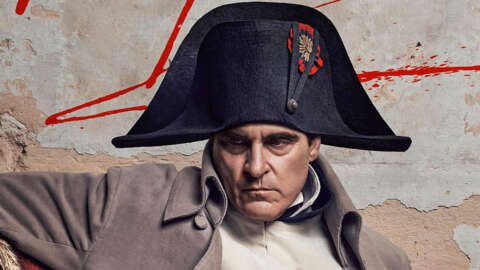Napoleon is a lot of fun to watch alongside Ridley Scott’s most famous historical epic, the Best Picture winner Gladiator. While Gladiator is more or less just an incredibly well-made prestige film that hits all the right notes by traditional standards for that type of film, Scott does something very different with his latter-day epics. Napoleon is not a thriller to inspire or make you feel good – the story instead demystifies history by showing that Napoleon Bonaparte was just an ordinary man responsible for millions of deaths. And it’s a lot more fun to watch than the more serious versions.
And probably more accurately, too much. As humans, we tend to think of ourselves as very serious people who only make intelligent and calculated decisions, but at the same time we know very well that this is not true – we are all a bunch of idiots. Nevertheless, we like to milk great historical figures so that we can hold them up on a pedestal as examples of the human race, and Bonaparte was certainly one of these larger-than-life figures.
But the Bonaparte we see in Napoleon is not considered in this way. Sure, he wins some battles over the course of the two and a half hour film, but the emphasis here is on Napoleon as a character, not as a strategist. And it’s a lot more interesting, at least when Ridley Scott is doing it.
Napoleon begins in 1793 with the execution of Marie Antoinette, which Napoleon witnessed. It’s a great scene, as the queen heads for the guillotine, the fruit is thrown, the film takes us through the full process of putting Marie Antoinette through the machine, and then she loses her head. It’s a highly experimental sequence that takes the audience into a performance that makes us feel like we’re experiencing the full mundaneness of the moment as well as its significance. It’s an important historical moment, yes, but in Napoleon, it’s just a Tuesday.
From there, the film takes us to many of Napoleon’s greatest achievements, from breaking the siege of Toulan at the beginning of his rise to his exile to Saint Helena. But, again, it’s not really about all of that. This movie doesn’t try to show you what a cool, smart guy Napoleon was, nor does it try to be a comprehensive, completely historically-accurate portrait of the man. Instead, it focuses on his infatuation with Josephine de Beauharnais (Vanessa Kirby) and how this infatuation informs his decision-making during his rise to power and subsequent reign as first consul and then as emperor.
To help make that point, we get multiple sex scenes from Napoleon Bonaparte, and they’re all pretty gross. One of these starts when Napoleon interrupts Josephine while she’s fixing her hair and does a silly little dance to tell her he’s ready for love – Josephine protests, but Napoleon He won’t stop doing his little horn dance and eventually she gives up. While Napoleon does his thing, Josephine looks very tired. He’s not exactly portrayed as a good or caring lover during these scenes.
After departing from his role in the first two seasons of The Crown, which I’ve always read as a very dry satire, Kirby feels comfortable with this not-quite-serious take on the blockbuster. He’s so comfortable here that he has no problem constantly taking control of the screen away from Phoenix, who I think may have channeled his Joker a little too much. He’s still a lot of fun, but Kirby often steals the show.
But the real star is still 85-year-old Ridley Scott, who brings everything he has to the film. And bless him for doing it—despite his and Martin Scorsese’s best efforts, the big-budget historical epic is a dying genre, and few filmmakers can make historical battle scenes so spectacular. In this day and age, Napoleon is one of a kind: an overpriced historical epic that spends most of its time making fun of its famous main subject, and doesn’t really treat him with any respect. Napoleon always sounds a little silly when he brags about his prowess as a military leader. And he brags a lot! But here is the point.
On a related note, I’m really intrigued by this song that Scott’s movies have taken on recently. His last three films—Napoleon, House of Gucci, and The Last Duel—are all based on true stories that don’t have much love for the people they’re about. While the three films are each a bit longer than they probably needed to be (all running north of two and a half hours), I agree with their disdain for the powerful. Judy Comer’s Lady Marguerite in The Last Duel is the only major character in the three films that isn’t treated as a joke. I find this way of looking at the world quite endearing and accurate – the rich and powerful usually don’t have many tangible positive attributes.
And humanly speaking, no, military prowess isn’t really a positive trait in most situations. As Josephine dies and Napoleon’s story ends on St. Helena, the film contains an important little postscript: it lists the large number of people who died as a result of each of Napoleon’s “great” campaigns. This is the lesson you should leave the theater with: it didn’t matter how good Napoleon was as a general, he was ultimately just someone who was personally responsible for endless death.
And also, he wasn’t that cool anyway. This film treats Napoleon with about the same respect that The Last Duel treated Matt Damon’s Jean-des-Caruges — very little — and perhaps rightly so.






